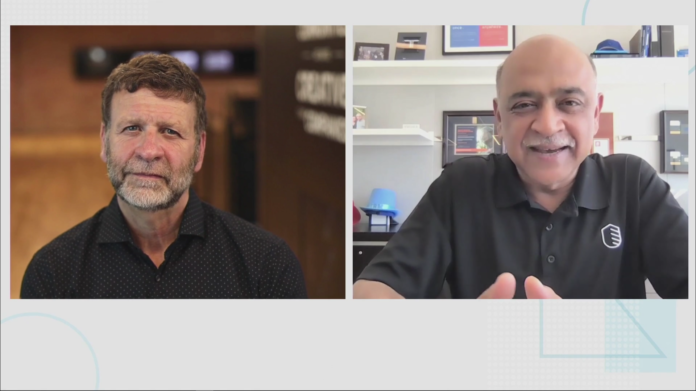Roughly a year after becoming Red Hat’s new chief executive officer, Paul Cormier took centre stage during the company’s annual summit on Tuesday to dissect the open-source software giant’s structural combination with IBM.
It has been about two years since IBM bought Red Hat for $34 billion. And even though IBM CEO Arvind Krishna has said Red Hat Openshift is the crown jewel of IBM’s plans to dominate the cloud industry, Red Hat continues to host separate channel partner programs and strategies.
“I think clients have all realized that hybrid cloud is the destination,” Krishna told Cormier during their joint keynote session, noting the main beneficiaries of hybrid cloud infrastructure are its enterprise and government clients that have “multiple public clouds” running in their offices.
Related:
IBM names new managed infrastructure business Kyndryl
These clients want to work with all hyperscalers, Krishna explained, meaning Red Hat has to meet their needs despite being tied to IBM’s hip.
“I always talk about how IBM might have preferences, but Red Hat cannot,” he said. “And to make the promise of hybrid…and make it really attractive and valuable for all of our clients, we have to work with all of them.”
Thanks to the Red Hat effect and IBM’s ongoing focus on becoming a software pipeline management and orchestration powerhouse, Big Blue finally got a taste of growth in the first quarter of 2021.
In Q1 2021, ending in March, IBM’s overall revenues rose by one per cent to $17.73 billion, the first time the company has increased revenues in two years. Red Hat revenue specifically grew 17 per cent from a year ago. Cloud and cognitive software sales grew by four per cent.
IBM Global Business Services (GBS), the business consulting arm of IBM dealing mostly with software services and IT consulting, experienced a 2.4 per cent revenue increase. Cloud revenue within GBS increased by 33 per cent year-over-year. Cormier says IBM is ramping up to become the largest professional services organization around OpenShift and Red Hat products.
The Red Hat Summit featured nearly 100 sessions, and dozens were dedicated to hybrid cloud application environments. Some were led by IBMers like Hillery Hunter, VP and CTO of IBM Cloud, who dived into services like OpenShift, Red Hat Enterprise Linux and Red Hat Ansible Automation.
Looking forward to Quantum
When Cormier asked Krishna what excited the IBM CEO the most heading into 2022, the conversation quickly shifted to quantum computing.
“I think the way Linux, OpenShift and Ansible and the rest of Red Hat begin to play a role in quantum computing is super exciting,” he answered.
Red Hat Summit continues today.
